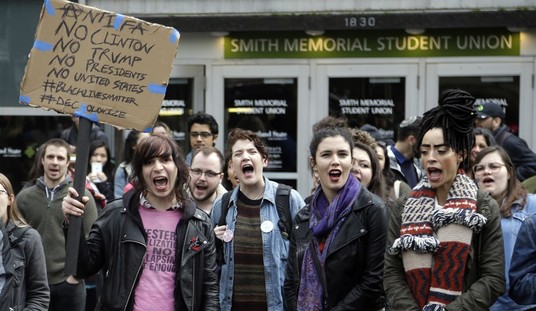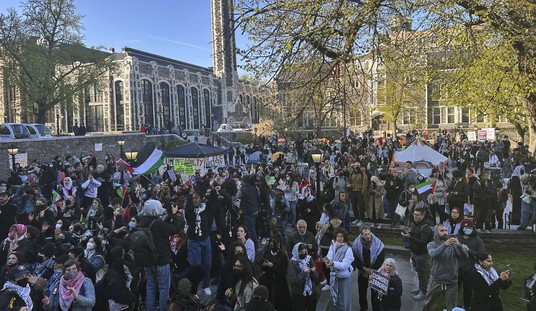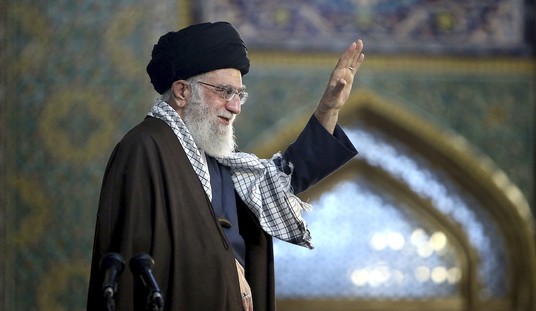It’s not exactly a secret that Israeli prime minister Benjamin Netanyahu opposes the terms of the framework for the deal with Iran on their nuclear program, but he offered a suggestion to improve it this week: demand that Iran recognize the state of Israel and its right to exist. If the Iranians want to create a peaceful nuclear energy program and refrain from using the economic windfall to sponsor regional terrorism and insurrection, what better way to show it than to open normal diplomatic relations with Jerusalem?
NPR’s Steve Inskeep wondered why the US wouldn’t make that part of their demands, and Obama said, in essence, because the Iranian leadership are anti-Semites with a seething hatred of Israel. And, er, we shouldn’t expect them to comply with something so obviously against their nature. Ahem.
So there’s still going to be a whole host of differences between us and Iran, and one of the most profound ones is the vile, anti-Semitic statements that have often come out of the highest levels of the Iranian regime. But the notion that we would condition Iran not getting nuclear weapons, in a verifiable deal, on Iran recognizing Israel is really akin to saying that we won’t sign a deal unless the nature of the Iranian regime completely transforms. And that is, I think, a fundamental misjudgment.
The — I want to return to this point. We want Iran not to have nuclear weapons precisely because we can’t bank on the nature of the regime changing. That’s exactly why we don’t want to have nuclear weapons. If suddenly Iran transformed itself into Germany or Sweden or France, there would be a different set of conversations about their nuclear infrastructure.
So, you know, the key here is not to somehow expect that Iran changes — although it is something that may end up being an important byproduct of this deal — but rather it is to make sure that we have a verifiable deal that takes off the table what would be a game-changer for them if in fact they possess nuclear weapons.
Of course, the problem with this scenario is that we need to trust the Iranians to keep their word in this deal, despite the fact that they have worked in secret for a decade and in the open for another decade to get this close to a nuclear weapon. Plus, we have to assume that their decades-long efforts to exercise hegemony in the region will get put aside with this agreement, and their irrational anti-Semitism will not motivate them to cheat and lie.
Well, maybe the verification protocols will just be so doggoned awesome that trust won’t enter into it. After all, as former UNSCOM chair Charles Duelfer reminds us, we’ve decided to put all of our reliance in this area on … Vladimir Putin:
Russia (and to a lesser extent France), were the key advocates in the Security Council for Iraq. We now know unequivocally, that Saddam was buying influence. When I ran the Iraq Survey Group in 2004, we created a team to collect as much information about Iraq’s resources and how it expended them. The broad goal was to understand Iraq’s strategic intentions and understand where WMD fit in. We had a unique opportunity to record how his regime operated and how it managed to manipulate the international environment. As a priority, we obtained all the Iraqi records of the oil transactions.
Over some political objections, I published these records in the so-called Duelfer Report in 2004 (see “Comprehensive Report of the Special Advisor to the DCI on Iraq’s WMD,” Volume 1, section 2, “Regime Finance and Procurement.” These records (and extensive debriefings of top Iraqi officials) clearly show that Iraq was compensating Russian officials, and other individuals. Included among the beneficiaries in the list of Iraqi oil allocations were “the Russian Communist Party,” “the son of the Russian ambassador,” “the Russian Foreign Ministry,” and, “the Russian Presidential Office.” Putin was also a key actor in many of the Russian commercial entities that were engaged in oil transactions and the illicit export of weapons to Iraq while sanctions were in place. …
If and when a detailed verification plan is agreed for an Iran nuclear agreement, the inspectors will have less access than in Iraq. The world may point to them as credible investigators—and they are. But whatever they report will go through the kaleidoscope of the Security Council. It will not be the IAEA that decides to re-impose sanctions. It will be the Security Council.
Putin will not give up his right to a veto. Nor will other members. Russia (and others) will have a stake in sustaining access to Iran’s markets, not re-imposing sanctions. The track record of Putin and Lavrov in the Iraq case suggests that they will be working bi-lateral deals with Tehran. Director of National Intelligence James Clapper will get tough questions in closed hearings, not just on whether American intelligence and IAEA inspectors can reliably detect prohibited Iranian nuclear activities, also what deals Moscow or Beijing or others may have with Tehran.
If I were John Kerry, I would not want to be defending a deal that depends upon Vladimir Putin.
Some of those tough questions will come from Senator Bob Corker, who now has to push his bill demanding Congressional review on his own after Bob Menendez’ withdrawal from the Senate Foreign Relations committee. The New York Times calls Corker the “key player in Iran accord,” and reports that he’s getting close to a veto-proof majority — especially with Chuck Schumer on board. With that in mind, the White House has begun schmoozing Corker to woo him into a delay:
It is no surprise, then, that the White House has spent the last few days publicly stroking Mr. Corker.
“A good and decent man,” Mr. Obama declared.
“Somebody who has considered this issue in a very principled way,” said the president’s spokesman, Josh Earnest.
The White House now views its central challenge as either negotiating a compromise with Mr. Corker or stopping enough Democrats from joining him so that he is short of a veto-proof majority, at least through June 30, the deadline to translate last week’s preliminary agreement with Iran onto paper. After that, officials said, Mr. Obama may be in a stronger position to argue the merits of the accord.
Conservatives are in the meantime watching carefully to make sure Mr. Corker does not soften. “Corker is under enormous pressure from the White House to delay or weaken his own bill,” said Dan Senor, a former Bush administration official. “But he has been strong on this issue, as has his committee and his caucus. I don’t think he’ll cave.”
So far, it’s no sale with Corker. He wants Obama to make the case for the deal to the entire Congress, not just to him, before lifting any sanctions on Iran. Most of those sanctions got applied by Congress, not Obama, although the statutes imposing them give Obama some leeway in enforcement for six months at a time. That will be what Corker’s bill changes, if it passes and survives a presidential veto. If he uses the same logic he offered Inskeep, Obama might just guarantee Corker a veto-proof majority.








Join the conversation as a VIP Member